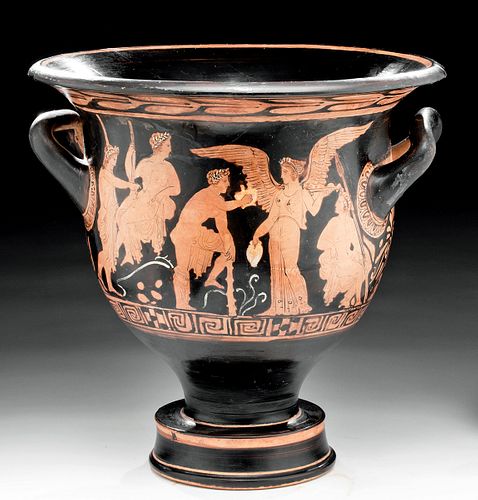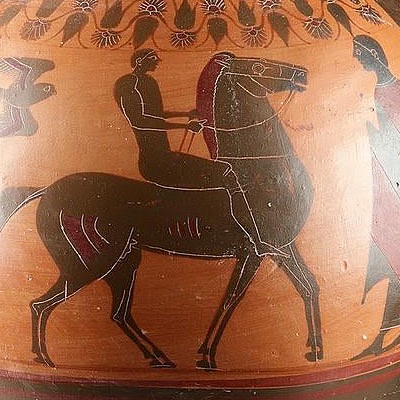Greek Attic Red-Figure Bell Krater - Herakles & Nike
Lot 23b
About Seller
Artemis Fine Arts
686 S Taylor Ave, Ste 106
Louisville, CO 80027
United States
Selling antiquities, ancient and ethnographic art online since 1993, Artemis Gallery specializes in Classical Antiquities (Egyptian, Greek, Roman, Near Eastern), Asian, Pre-Columbian, African / Tribal / Oceanographic art. Our extensive inventory includes pottery, stone, metal, wood, glass and textil...Read more
Categories
Estimate:
$18,000 - $30,000
Absentee vs Live bid
Two ways to bid:
- Leave a max absentee bid and the platform will bid on your behalf up to your maximum bid during the live auction.
- Bid live during the auction and your bids will be submitted real-time to the auctioneer.
Bid Increments
| Price | Bid Increment |
|---|---|
| $0 | $25 |
| $300 | $50 |
| $1,000 | $100 |
| $2,000 | $250 |
| $5,000 | $500 |
| $10,000 | $1,000 |
| $20,000 | $2,500 |
| $50,000 | $5,000 |
| $100,000 | $10,000 |
| $200,000 | $20,000 |
About Auction
By Artemis Fine Arts
Jun 4, 2020
Set Reminder
2020-06-04 10:00:00
2020-06-04 10:00:00
America/New_York
Bidsquare
Bidsquare : Exceptional Antiquities, Asian, Ethnographic
https://www.bidsquare.com/auctions/artemis-gallery/exceptional-antiquities-asian-ethnographic-5185
An important one-day auction featuring museum-worthy examples of Egyptian, Greek, Roman, Etruscan, Near Eastern, Far East / Asian, Pre-Columbian, African / Tribal, Oceanic, Native American, Spanish Colonial, Russian, Fossils, Ancient Jewelry, Fine Art, so much more! Artemis Fine Arts info@artemisgallery.com
An important one-day auction featuring museum-worthy examples of Egyptian, Greek, Roman, Etruscan, Near Eastern, Far East / Asian, Pre-Columbian, African / Tribal, Oceanic, Native American, Spanish Colonial, Russian, Fossils, Ancient Jewelry, Fine Art, so much more! Artemis Fine Arts info@artemisgallery.com
- Lot Description
Ancient Greece, Athens (Attic), ca. 4th century BCE. A sizeable and very fine bell krater decorated via the red-figure technique. Side A presents a marvelous scene centered on Herakles who is adeptly posed in profile with his left hand placed upon his raised knee while gallantly offering a kantharos in his right hand to Nike. Nike stands in contrapposto with her magnificent wings outspread and faces the legendary hero. She wears a diaphanous chiton and holds a situla and a phiale. The onlookers to the left of Herakles and Nike likely represent Dioscuri - the twin half brothers Castor and Pollux - perhaps holding torches, and to the right is another nude laureate male with a spear. Side B presents three draped youths, two on the left facing the rightmost figure. Size: 11.75" W handlespan x 13" H (29.8 cm x 33 cm)
In addition to this marvelous iconography, the artist included an impressive decorative program. Below the rim is a laurel leaf garland. Underscoring the figural imagery is a band of Greek key and checkerboard variant motifs. Finally, complex palmettes adorn the areas beneath the upraised loop handles, and bands of egg-and-dart surround the termini of the handles.
Perhaps the most exciting innovation in Greek vase painting was the red-figure technique, invented in Athens around 525 BCE and beloved by other artists of Magna Graecia. The red-figure technique allowed for much greater flexibility as opposed to the black-figure technique, for now the artist could use a soft, pliable brush rather than a rigid metal graver to delineate interior details, play with the thickness of the lines, as well as build up or dilute glazes to create chromatic effects. The painter would create figures by outlining them in the natural red of the vase, and then enrich these figural forms with black lines to suggest volume, at times perspectival depth, and movement, bringing those silhouettes and their environs to life. Beyond this, fugitive pigments made it possible for the artist to create additional layers of interest and detail as we see in this example.
Provenance: ex-French collection; acquired by current owner at Paris art market in 2007
All items legal to buy/sell under U.S. Statute covering cultural patrimony Code 2600, CHAPTER 14, and are guaranteed to be as described or your money back.
A Certificate of Authenticity will accompany all winning bids.
We ship worldwide and handle all shipping in-house for your convenience.
#152678Professionally repaired from multiple pieces with restoration over the break lines and some areas of repainting over the break lines. Expected surface wear commensurate with age. Nice fugitive white pigment remains.Condition
- Shipping Info
-
All shipping is handled in-house for your convenience. Your invoice from Artemis Gallery will include shipping calculation instructions. If in doubt, please inquire BEFORE bidding for estimated shipping costs for individual items.
-
- Buyer's Premium



 EUR
EUR CAD
CAD AUD
AUD GBP
GBP MXN
MXN HKD
HKD CNY
CNY MYR
MYR SEK
SEK SGD
SGD CHF
CHF THB
THB
















